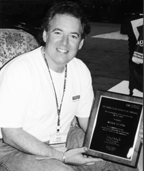 |
 |
Omni Solutions Sponsor Message |
|
|
|

Mark Klein
|
Payoffs from
the Passion of Porting
In the hardest times in its history, the HP 3000 got a
little help from its friends. One of the platform’s greatest
friends may be Mark Klein, the ORBiT Software R&D chief whose
greatest contribution happened off the clock, on his own time. Klein
did the bootstrap porting of the Gnu Software Foundation C++ compiler
that set the stage for the HP 3000’s compatibility with other
systems. Without a C++ compiler, things like Web servers, Java, Samba
file sharing, Internet domain name services and many of the current
Posix tools wouldn’t have arrived on the HP 3000 in time, if at
all. Working nights and weekends for the equivalent of a year of
full-time coding, Klein brought this new language to the HP 3000, one
that opened the door for the HP 3000’s interoperability. Klein also led the way in software porting to the platform
by bringing the freeware C++ to the system. Many commercial and Unix
programs are written in C++, but without this language on the 3000,
programs couldn’t be ported. Solving the problem of
bootstrapping a port demands the skills of an inventor, since the
tools to finish the job have to be invented first. In 1995 word of
Klein’s invention moved through HP’s 3000 labs and the
developer community, and the system was on its way toward its next
generation. Without his C++ on the 3000 in this timeframe, the
platform wouldn’t have gotten its Internet capabilities in time
— and HP might have made a different decision about moving the
platform onto the IA-64 architecture. HP relies on Klein’s C++
port today in the division labs, and he supports the compiler he
created. The news of a new C++ compiler didn’t have far to travel to get to the 3000 labs. Klein has worked with the 3000 division as a contract consultant since 1983, which “virtually became a full-time job,” according to Klein’s resume. It’s an impressive document, showing his work on the compiler, porting Java to the 3000, migrating TurboIMAGE to the PA-RISC systems and supporting the Just In Time compiler for Java. He joined ORBiT in 1991 full time, building up the backup and datacenter provider’s R&D staff from a single person to 10, and architecting Backup+. Along the way Klein has led more Master’s-Level HP 3000 programmers — those who are invited to the elite Master’s Conference each spring — than any other 3000 shop’s R&D operation. The average level of HP 3000 experience at ORBiT is more than 20 years. With his own 25 years of HP 3000 experience and a key
contribution to the 3000’s survival under his belt, Klein has
been honored by HP with the HP 3000 Contributor Award (above),
presented by the 3000 division to the person who has helped the
platform. The nights and weekends spent porting haven’t come at
the cost of a personal life for Klein; he’s been married 21
years and is the father of two children. As the platform’s
technical wizards and apprentices gather in California for training
and debate this month, we asked Klein how he manages his time and his
resources to work on continuing porting projects like the Gnu native
Java compiler for MPE — another tool to help the HP 3000
grow. It
was actually two separate events. The first was a comment by someone
from within HP that “it couldn’t be done” in response
to a question about bringing a third-party C++ to the HP 3000. The
next was a plan by ORBiT to build a product that required an
object-oriented database. I had found something called Exodus that
was publicly available. The short of it was that Exodus implemented a
static C++ built upon Gnu C++. This language was called E and worked
with the Exodus Storage Manager. To make this work, we needed to port
Gnu C++ to the HP 3000. I
have a very understanding family. My wife tells a story about my son
in his younger years. I’d go away, because of the consulting and
the other work I’d do, and work 60-70 hour weeks. I came home
once and he misbehaved, and I reprimanded him. He looked over at my
wife and said, “Can he do that?” Her answer was, “Of
course he can. He’s your father!” My philosophy is that
when you’re in your 30s and 40s those are your best income
producing years, and you need to take advantage of it to build the
foundation for the rest of your life. Absolutely ... and it is still on the list! I’ve done
the Gnu and other ports on my own time, typically weekends and
evenings, and that meant I needed to manage the time pretty well! There is a learning curve too, I won’t minimize
that. The biggest things going for Unix are its interoperability
and the size of its talent pool. Arguments can be made that when they
run, Unix systems run well. The things that you used to be able to
point to, like NFS, just aren’t [exclusive to Unix] anymore.
Quest sells an NFS for the 3000. I haven’t tried to bring a real
graphics-intensive package to the 3000. It’s not really a
graphics platform. Hard to point to any one thing. I’ve learned a lot of
tricks over the years that all have their place. I’d have to say
the biggest thing was the transition from procedural to object
orientation. It just kinda happened and was like a light turning on.
I think the biggest event to solidify that was doing the UNiBACK GUI
for ORBiT in Java. Better — I’m in the object orientation advocacy
category. Actually, I find Java to be a better language than C++. It
has removed the bad parts of C that carried over into C++. I really
like that language. I’m spending more time with Java than C++.
The language is far superior to C++. With the work we’re doing
here at ORBiT, I’m doing more in Java. The native compiler for
Java exists and runs on MPE. The back-end run-time library is where
I’m stuck, but the threading changes in MPE/iX 6.5 will help
that. That’s hard to say. HP is saying that their compiler
technology is what will make IA-64 be what it will be on the HP
platforms. But there are also a lot of bright people working on GCC,
and this “virtual development lab” is far greater than any
lab for any one company such as HP. Many people doing active
development on the GCC are in research facilities at some of the top
universities. When there is effectively only “one” platform
(IA-64), then GCC will probably become highly adapted to that
environment which will mean that the minimal performance differences
seen today because of generalization will probably disappear. I’m still wrestling with that question myself. The
3000 needs to play in the enterprise-wide community. If other
machines in the enterprise are SAN-based machines, the 3000 needs to
play in that playground. I’ve come to no clear conclusion. I
know that hardware technologies will have an impact on the backup
business in the future, but I still think that there will be some
niches where a software solution still fits into the picture.
Serverless-based backup is a possibility with SANs. We’re
looking at our future strategies as well, based on the fact the 3000
is going to play in the SAN sandbox. A
much more robust pass-through driver. I’m not sure we could use
the existing driver to get to some of the commands the various robots
would offer. If we could see a better driver that could handle
mistakes that a programmer like me might make, and not bring the
machine down — because we’re talking about privileged
software that runs on a very low level — then that might allow
us to bring other devices to the 3000 more quickly. We don’t
have the ability to write drivers on the 3000 today. There are a couple of things. I do use Qedit quite a bit
for the MPE stuff. But I also use vi quite a bit too, for the
Posix-based stuff. I think the tools that I use most in what I do are
the Lund Performance Tools written by Stan Sieler. I can’t live
without Avatar reverse compiler or CSEQ. The nature of some of the
things we need to do demands a tool like Avatar. CSEQ is more
important if you’re working with Gnu C++. I
do like the visual editors. They help produce better code. I like the
Visual Cafe IDE, and CodeWright. I’d like to see an IDE
available for MPE like Visual Cafe. I know that the Whisper
Programmer Studio is similar. Visual Cafe can do remote debugging, to
do compilations on the workstation. Now, why do you wanna open a can of worms? It is difficult
because all of us would like to be working on the latest and greatest
bleeding-edge technology. And we all have very strong personalities,
which can and does cause a bit of friction. But what’s most
impressive with this group is its longevity, both in the HP community
and at ORBiT. Our newest member is Paul Taffel, who is well known and
respected in the community. By ORBiT standards, he’s the
“newbie,” as most of the rest of us have between seven and
10 years working for ORBiT. It’s unheard of in the high-tech
industry to have that type of longevity!
|
Copyright The 3000 NewsWire. All rights reserved.
